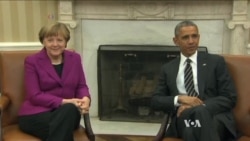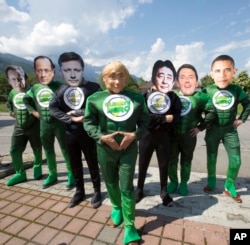U.S. President Barack Obama will try to rally the Group of Seven partners to extend sanctions on Russia for its continuing involvement in Ukraine as the nations' leaders gather Sunday in Germany to begin a two-day summit.
Hours after arriving in Germany Sunday, he appeared outdoors with German Chancellor Angel Merkel under sunny skies at a picturesque Bavarian village resort where Germans, many of them wearing traditional German folk garb, listened to remarks from both leaders.
Obama said he was looking forward to discussing with his German counterpart the "shared future" of the U.S. and Germany, including "standing up to Russian aggression in Ukraine."
Chancellor Merkel called the U.S. "our friend and our partner."
Merkel will also welcome heads of state and diplomats from Britain, Japan, France, Italy, Canada and the European Union for talks, the formal purpose of which is trade. But the issues of Ukraine, including Russia's annexation of Crimea, and the strategy against the Islamic State group are expected to dominate the discussions.
Some G-7 nations are participating in allied bombing raids against the Islamic State group, and the fighters’ recent capture of Ramadi in Iraq has left many wondering whether Obama’s strategy is working.
Biggest issue: Russia
The biggest issue, however, is Russia - excluded from the meeting for a second year. Russia had been part of what was known as the Group of Eight since 1998, but was expelled last year over its activities in Ukraine.
There are questions here about the U.S. leader’s approach to Russia, one that White House officials, including spokesman Josh Earnest, acknowledge has not changed Russian President Vladimir Putin’s behavior in Ukraine.
“The economic pressure that's been applied to Russia has not yet resulted in President Putin changing his strategic calculus inside of Ukraine," Earnest said.
"We continue to see the Russian military violate the sovereignty and territorial integrity of Ukraine. We continue to see the movement of materiel and personnel across the Ukrainian border in support of Russian-backed separatists in Ukraine," he added.
The United Nations is urging all sides in the Ukraine conflict to fully respect the cease-fire agreement reached earlier this year in Minsk.
"We are either looking at a return to a deepening, intractable conflict or a momentary upsurge in parts of the conflict zone, " U.N. political chief Jeffrey Feltman told an emergency Security Council meeting Friday.
Putin interview
Speaking about the Ukraine crisis in an interview with the Italian newspaper Il Corriere della Sera, published Saturday, Putin accused Kyiv of being unwilling to implement the Minsk agreement.
Putin said that the peace deal should be implemented in close coordination with the self-proclaimed Donetsk and Luhansk republics’ leaderships, to which Kyiv objects.
Putin said the United States and the European Union should influence the Ukrainian government to respect the peace deal as envisioned in the agreement. Russia, he said, would do its part to influence the authorities of separatist republics.
He added that there is "no need to fear Russia."
U.S. Secretary of Defense Ash Carter said Friday that whatever Putin's "efforts might be to scroll backward in time Russia's trajectory, the rest of the world and the rest of Europe are continuing to go forward."
Diplomatic solution
Obama continues to believe the solution lies in diplomacy and not military involvement. He will rally G-7 members to extend sanctions that are due to expire in the next two months.
The Kremlin insists it has no direct role in the fighting in eastern Ukraine and has repeatedly denied supporting rebels with arms and fighters.
Pressuring and isolating Russia diplomatically is becoming a more complicated matter as the U.S. administration recognizes Moscow’s part in international efforts to reach a nuclear deal with Iran and rid Syria of chemical weapons — a role U.S. officials describe as positive and important.
Last month, U.S. Secretary of State John Kerry traveled to the Russian resort of Sochi and met with Putin.
At the G-7 gathering in Germany, Obama will try to send a strong and unified message that the United States maintains its leadership role.
"There is growing sensitivity at the White House about criticism of the lack of American leadership or the lack of policy effectiveness on these two geostrategic issues, but at this point, this summit is an opportunity for foreign leaders to have their candid conversations privately and out forward a unity message of their approach on an incredible range of issues," said Heather Conley, a Europe analyst at the Center for Strategic and International Studies in Washington.
IS advances
On the Islamic State’s advances in Iraq, the U.S. leader will huddle with G-7 partners to discuss the next steps in the bid to degrade and ultimately destroy the group.
U.S. officials have expressed concerns that Iraqi forces may be losing the will to fight as evidenced by their retreat during the recent fall of Ramadi.
Obama is due to meet with Iraqi Prime Minister Haider al-Abadi on Monday to learn more about the situation on the ground.
Conley said it would be an important first face-to-face meeting.
“Prime Minister Abadi said some very strong statements where he wanted much more U.S. and coalition activity — again very sensitive to the criticism that was leveled by Defense Secretary Ash Carter that, you know, the Iraqi forces lacked the will," she said.
Another big topic will be Iran. This will be the G-7 partners’ last meeting before a deadline this month for a nuclear agreement.
Greece's financial crisis is expected to be on the agenda as well. Germany's Merkel spoke by phone Saturday with Greek Prime Minister Alexis Tsipras and French President Francois Hollande about Athens' debt crisis. No details were reported on the conversation, which came as officials work toward a deal, needed by month's end, to ensure that European bailout payments to Athens continue.
G-7 officials will also discuss Africa. Newly installed Nigerian President Muhammadu Buhari will join leaders for discussions on the fight against the Boko Haram group. Also on hand will be Liberia’s President Ellen Sirleaf Johnson for discussions on Ebola.
Meanwhile, an estimated 4,000 to 5,000 demonstrators packed the German Alpine resort of Garmisch-Partenkirchen on Saturday, protesting over a wide range of causes before the arrival of the G-7 leaders.
There were scuffles between police and protesters, who included black-clad anarchists, and anti-capitalist and war protesters. Some protesters threw bottles at police, who responded with pepper spray.
About 20,000 German security personnel have been deployed at the summit site.






